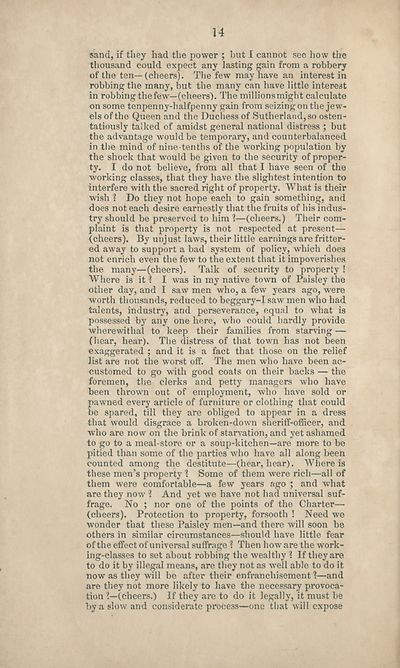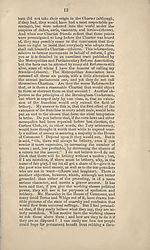Download files
Complete book:
Individual page:
Thumbnail gallery: Grid view | List view

14
sand, if they had the power ; but I cannot sec how the
thousand could expect any lasting gain from a robbery
of the ten—(cheers). The few may have an interest in
robbing the many, but the many can have little interest
in robbing the few—(cheers). The millionsmight calculate
on some tenpenny-halfpenny gain from seizing on the jew¬
els of the Queen and the Duchess of Sutherland, so osten¬
tatiously talked of amidst general national distress ; but
the advantage would be temporary, and counterbalanced
in the mind of nine-tenths of the working population by
the shock that would be given to the security of proper¬
ty. I do not believe, from all that I have seen of the
working classes, that they have the slightest intention to
interfere with the sacred right of property. What is their
wish 2 Do they not hope each to gain something, and
does not each desire earnestly that the fruits of his indus¬
try should be preserved to him 2—(cheers.) Their com¬
plaint is that property is not respected at present—
(cheers). By unjust laws, their little earnings are fritter¬
ed away to support a bad system of policy, which does
not enrich even the few to the extent that it impoverishes
the many—(cheers). Talk of security to property !
Where is it 2 I was in my native town of Paisley the
other day, and I saw men who, a few years ago, were
worth thousands, reduced to beggary-I saw men who had
talents, industry, and perseverance, equal to what is
possessed by any one here, who could hardly provide
wherewithal to keep their families from starving —
(hear, hear). The distress of that town has not been
exaggerated ; and it is a fact that those on the relief
list are not the worst off. The men who have been ac¬
customed to go with good coats on their backs — the
foremen, the clerks and petty managers who have
been thrown out of employment, who have sold or
pawned every article of furniture or clothing that could
be spared, till they are obliged to appear in a dress
that would disgrace a broken-down sheriff-officer, and
who are now on the brink of starvation, and yet ashamed
to go to a meal-store or a soup-kitchen—are more to be
pitied than some of the parties who have all along been
counted among the destitute—(hear, hear). Where is
these men’s property 2 Some of them were rich—all of
them were comfortable—a few years ago ; and what
are they now 2 And yet we have not had universal suf¬
frage. No ; nor one of the points of the Charter—
(cheers). Protection to property, forsooth ! Need we
wonder that these Paisley men—and there will soon be
others in similar circumstances—should have little fear
of the effect of universal suffrage 2 Then how are the work¬
ing-classes to set about robbing the wealthy 2 If they are
to do it by illegal means, are they not as well able to do it
now as they will bo after their enfranchisement 2—and
are they not more likely to have the necessary provoca¬
tion 2—(cheers.) If they are to do it legally, it must be
by a slow and considerate process—one that will expose
sand, if they had the power ; but I cannot sec how the
thousand could expect any lasting gain from a robbery
of the ten—(cheers). The few may have an interest in
robbing the many, but the many can have little interest
in robbing the few—(cheers). The millionsmight calculate
on some tenpenny-halfpenny gain from seizing on the jew¬
els of the Queen and the Duchess of Sutherland, so osten¬
tatiously talked of amidst general national distress ; but
the advantage would be temporary, and counterbalanced
in the mind of nine-tenths of the working population by
the shock that would be given to the security of proper¬
ty. I do not believe, from all that I have seen of the
working classes, that they have the slightest intention to
interfere with the sacred right of property. What is their
wish 2 Do they not hope each to gain something, and
does not each desire earnestly that the fruits of his indus¬
try should be preserved to him 2—(cheers.) Their com¬
plaint is that property is not respected at present—
(cheers). By unjust laws, their little earnings are fritter¬
ed away to support a bad system of policy, which does
not enrich even the few to the extent that it impoverishes
the many—(cheers). Talk of security to property !
Where is it 2 I was in my native town of Paisley the
other day, and I saw men who, a few years ago, were
worth thousands, reduced to beggary-I saw men who had
talents, industry, and perseverance, equal to what is
possessed by any one here, who could hardly provide
wherewithal to keep their families from starving —
(hear, hear). The distress of that town has not been
exaggerated ; and it is a fact that those on the relief
list are not the worst off. The men who have been ac¬
customed to go with good coats on their backs — the
foremen, the clerks and petty managers who have
been thrown out of employment, who have sold or
pawned every article of furniture or clothing that could
be spared, till they are obliged to appear in a dress
that would disgrace a broken-down sheriff-officer, and
who are now on the brink of starvation, and yet ashamed
to go to a meal-store or a soup-kitchen—are more to be
pitied than some of the parties who have all along been
counted among the destitute—(hear, hear). Where is
these men’s property 2 Some of them were rich—all of
them were comfortable—a few years ago ; and what
are they now 2 And yet we have not had universal suf¬
frage. No ; nor one of the points of the Charter—
(cheers). Protection to property, forsooth ! Need we
wonder that these Paisley men—and there will soon be
others in similar circumstances—should have little fear
of the effect of universal suffrage 2 Then how are the work¬
ing-classes to set about robbing the wealthy 2 If they are
to do it by illegal means, are they not as well able to do it
now as they will bo after their enfranchisement 2—and
are they not more likely to have the necessary provoca¬
tion 2—(cheers.) If they are to do it legally, it must be
by a slow and considerate process—one that will expose
Set display mode to:
![]() Universal Viewer |
Universal Viewer | ![]() Mirador |
Large image | Transcription
Mirador |
Large image | Transcription
| Antiquarian books of Scotland > Politics & government > Complete suffrage > (18) |
|---|
| Permanent URL | https://digital.nls.uk/125712343 |
|---|
| Description | Thousands of printed books from the Antiquarian Books of Scotland collection which dates from 1641 to the 1980s. The collection consists of 14,800 books which were published in Scotland or have a Scottish connection, e.g. through the author, printer or owner. Subjects covered include sport, education, diseases, adventure, occupations, Jacobites, politics and religion. Among the 29 languages represented are English, Gaelic, Italian, French, Russian and Swedish. |
|---|

